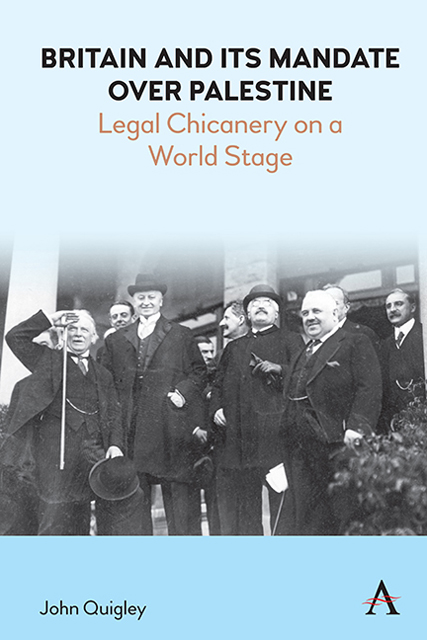Book contents
- Frontmatter
- Contents
- Preface
- Setting the Stage: Was Britain’s Rule in Palestine Legal?
- 1 The Balfour Declaration Is the Focal Point for the Legal Situation of Palestine
- 2 The Balfour Declaration Was a Binding Commitment to the Jewish People
- 3 The Jewish National Home Meant a Jewish State
- 4 The Balfour Declaration Was Issued to Affirm Jewish Rights in Palestine
- 5 The Paris Peace Conference Raised Jewish Statehood to the International Level
- 6 Britain’s Allies Made the Balfour Declaration an International Commitment
- 7 Britain’s Allies Endorsed Jewish Rights
- 8 Britain Took on Palestine Because of the League’s Mandate System
- 9 The League of Nations Protected Palestine’s Arab Population
- 10 Britain Was Given Palestine by the League of Nations
- 11 The League of Nations Put the Palestine Mandate into Legal Force
- 12 The Peace Treaty with Turkey Legalized Britain’s Status in Palestine
- 13 The Palestine Mandate Document Was a Treaty between Britain and the League
- 14 The League of Nations Required Britain to Implement the Balfour Declaration
- 15 The Palestine Mandate Document Implemented the League Covenant
- 16 The Palestine Mandate Document Recognized Jews as a National Group
- 17 The Palestine Mandate Document Bound Britain to the Balfour Declaration
- 18 The International Community Committed Itself to the Balfour Declaration
- 19 Britain Held Legal Status in Palestine
- 20 The United Nations Charter Carried Forward a Jewish Entitlement to Statehood
- Postscript: Why History Matters
- Documents Annex
- Notes
- Bibliography
- Index
19 - Britain Held Legal Status in Palestine
Published online by Cambridge University Press: 10 January 2023
- Frontmatter
- Contents
- Preface
- Setting the Stage: Was Britain’s Rule in Palestine Legal?
- 1 The Balfour Declaration Is the Focal Point for the Legal Situation of Palestine
- 2 The Balfour Declaration Was a Binding Commitment to the Jewish People
- 3 The Jewish National Home Meant a Jewish State
- 4 The Balfour Declaration Was Issued to Affirm Jewish Rights in Palestine
- 5 The Paris Peace Conference Raised Jewish Statehood to the International Level
- 6 Britain’s Allies Made the Balfour Declaration an International Commitment
- 7 Britain’s Allies Endorsed Jewish Rights
- 8 Britain Took on Palestine Because of the League’s Mandate System
- 9 The League of Nations Protected Palestine’s Arab Population
- 10 Britain Was Given Palestine by the League of Nations
- 11 The League of Nations Put the Palestine Mandate into Legal Force
- 12 The Peace Treaty with Turkey Legalized Britain’s Status in Palestine
- 13 The Palestine Mandate Document Was a Treaty between Britain and the League
- 14 The League of Nations Required Britain to Implement the Balfour Declaration
- 15 The Palestine Mandate Document Implemented the League Covenant
- 16 The Palestine Mandate Document Recognized Jews as a National Group
- 17 The Palestine Mandate Document Bound Britain to the Balfour Declaration
- 18 The International Community Committed Itself to the Balfour Declaration
- 19 Britain Held Legal Status in Palestine
- 20 The United Nations Charter Carried Forward a Jewish Entitlement to Statehood
- Postscript: Why History Matters
- Documents Annex
- Notes
- Bibliography
- Index
Summary
Britain was largely successful during the 1920s in escaping criticism that it lacked legal status. Other states focused on their own interests in Palestine. That passivity let Britain operate as if it were in Palestine legitimately. If Britain were merely a belligerent occupant, the infusion of immigrants from Europe and the role the Zionist Organization played in governance were unlawful.
In 1932, however, a situation developed in which Britain could not avoid the issue of its status in Palestine. The British Government found itself in a dilemma from which it could extricate itself only by asking other major powers what they thought Britain's status in Palestine to be. In that year, Britain enacted tariffs for goods entering Britain from foreign countries, imposing, in general, a duty amounting to 10 percent of their value. The dilemma was that the British Government did not want to charge this duty on goods entering Britain from its various possessions around the world. Parliament had provided an exception for this situation in the 1932 legislation, which was called the Import Duties Act., The exception was that the Government was given the option to grant what was called a “colonial preference” to goods entering Britain “from any part of the British Empire.” Mandate territories were mentioned specifically in the Act, as Parliament knew they would present a problem. The Import Duties Act authorized the Government to accord a “colonial preference” to “any territory in respect of which a mandate of the League of Nations is being exercised by the Government of the United Kingdom.”
The Government issued an order granting a preference to three territories Britain held under mandate in Africa: Tanganyika, Cameroons, and Togoland. These territories fell under Covenant Article 22, paragraph 5. Their status was lower than that of Turkey's Arab territories, which fell under Article 22, paragraph 4, as having attained “a stage of development where their existence as independent nations can be provisionally recognized.”
The Government delayed, however, in issuing a comparable order that would have applied to Palestine. The reason for the Government's hesitancy was that if it accorded Palestine a preference, states with which Britain had a bilateral most favored nation treaty might claim that goods entering from their own territories were entitled to the same preference.
- Type
- Chapter
- Information
- Britain and its Mandate over PalestineLegal Chicanery on a World Stage, pp. 139 - 144Publisher: Anthem PressPrint publication year: 2022

